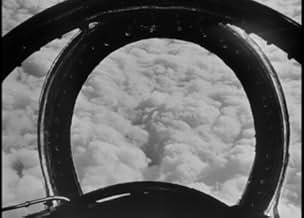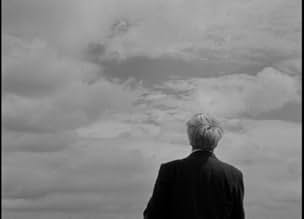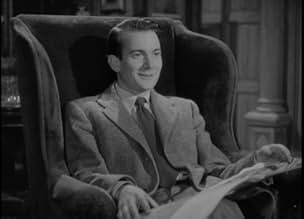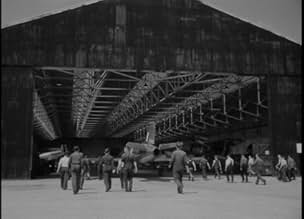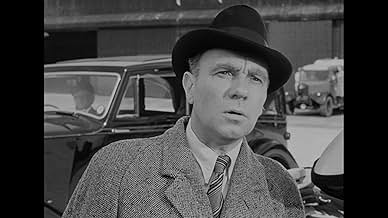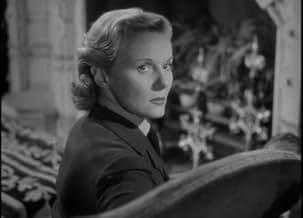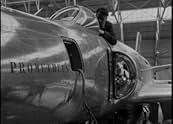IMDb-BEWERTUNG
6,7/10
2543
IHRE BEWERTUNG
Füge eine Handlung in deiner Sprache hinzuFictionalized story of British aerospace engineers solving the problem of supersonic flight.Fictionalized story of British aerospace engineers solving the problem of supersonic flight.Fictionalized story of British aerospace engineers solving the problem of supersonic flight.
- 1 Oscar gewonnen
- 9 Gewinne & 5 Nominierungen insgesamt
Rodney Goodall
- Little Boy
- (Nicht genannt)
Donald Harron
- ATA Officer
- (Nicht genannt)
Vincent Holman
- Factor
- (Nicht genannt)
Jolyon Jackley
- Susan's Baby
- (Nicht genannt)
Douglas Muir
- Controller
- (Nicht genannt)
Leslie Phillips
- Controller
- (Nicht genannt)
Anthony Snell
- Peter Makepeace
- (Nicht genannt)
Sally-Jane Spencer
- Daughter of Philip
- (Nicht genannt)
Robert Brooks Turner
- Test Bed Operator
- (Nicht genannt)
Empfohlene Bewertungen
By many standards, David Lean's production of the film he directed in 1952, "The Sound Barrier" is both unusual and I suggest rewarding. The screenplay by Terence Rattigan I found to be riveting throughout. This I judge stems from the fact that its subject is men of vision, and what they do to about their greed for something unnameable, necessary and sometimes deadly. The author in the film is at pains not to paint such men as glory hunters, nor seekers after excitement alone; in one scene, the central character talks about the fliers of the past, and then suggests the men of the future will need vision even more than flying skills to conquer what awaits us--and the answer to what that is is given as "the stars"--called the final frontier in this film in all but name. There are three fliers we meet in the film at a fictitious industrial empire called Ridgefield. The boss's son who hasn't got what a flier needs, Tony, who marries his daughter and reaches his limit because he lacks the necessary genius, and Philip, who has "the right stuff". What I find extraordinary about this very well-directed cinematic tale is that it is always about the people and the joy and danger of flight at the same time, without the focus ever losing sight of the people. The music for this film was supplied by Malcolm Arnold, and it is extraordinary almost everywhere but I find never intrusive. One sequence involves one of the three pilots taking his new wife for a swift flight to Cairo from England; the scene accomplishes many things at once. She learns because of her journey, what some men see in the serenity of the sky, and even its danger; it introduces us to the third pilot and his wife; and we are given a sense of the camaraderie of the men who flew in those days; another such moment occurs when the French ace Geoffrey de Havilland is killed trying to break the sound barrier ahead of all others. Jack Hildyard and several others supplied the cinematography and aerial scenes; Elizabeth Hemminges did a fine subdued job on the costumes; Vincent Korda is credited with the Art Department's superb work while Muir Matheson is acknowledged as music director. Among the smallish cast, the pilots are all beautifully played. bright Nigel Patrick is likable ace Tony, young Denholm Elliot stands out as the boss's son, and John Justin is just right as the third of the trio, Philip. Joseph Tomelty is admirable as Will Sparks, the designer tormented by his own part in causing test pilots to risk their lives; Ann Todd is good as the tormented Susan, wife to Tony and daughter of the boss of Ridgefield. Dinah Sheridan is also lovely as Philip's brave wife; but it is Ralph Richardson's powerful realization of John Ridgefield, former pilot, towering presence and inspiring and dangerous leader of men who along with Justin gives the film its unusual dimension of mind and purpose. One may quarrel with the motivations attributed to Richardson in the last scenes; but he has been so alone in his vision and at such a cost, he may be forgiven for asking at last to be understood. The ending I find to be most satisfying, the film's climax tremendously moving. This is a great film, which has never been appreciated as it should have been. It is B/W film-making at its dramatic best for my money. Its science may not be perfect, but its depiction of human merit and what happens when that quality is lacking in a man is powerful indeed. Not to be missed.
This black and white early 50s movie shows crusty Britain at its stiff upper lip best. It is the story of mans obsession with speed, and a ruthless plane makers ambition to succeed in building a supersonic jet. Richardson plays the tycoon whose dream kills his son and son-in-law, but who finally sees the error of his ways and whose daughter returns to the cold family home with his grandson.
The film is also a vehicle to show the world Britain's proud lead in jet technology. There is a classic sequence in the film where the happy daughter and son-in-law deliver a De Havilland Vampire jet fighter to Egypt. They set off at breakfast time in England and hurtle over the English Channel, the Alps, Ancient Greece and the Pyramids before arriving in at the airfield. Of course we take this for granted now, but 47 years ago this was unheard of. The director contrasts the old ruins and remains of our ancient ancestors with the marvel of the modern age: the jet plane.
The film also introduced THE marvel of the early fifties, the De Havilland Comet jet liner. This beautiful but flawed machine was in service SIX years before any other jet liner and for a while, the world rushed to De Havillands, and Britains door. For two years the worldwide fleet gave the travelling of the future.
In every other way this is an eccentrically English film with creaky old houses, cottages with roses around the door and eccentric engineers. Shout in glorious black and white it conveys a sense of wonder and optimism in the future, whilst being thoroughly old fashioned
The film is also a vehicle to show the world Britain's proud lead in jet technology. There is a classic sequence in the film where the happy daughter and son-in-law deliver a De Havilland Vampire jet fighter to Egypt. They set off at breakfast time in England and hurtle over the English Channel, the Alps, Ancient Greece and the Pyramids before arriving in at the airfield. Of course we take this for granted now, but 47 years ago this was unheard of. The director contrasts the old ruins and remains of our ancient ancestors with the marvel of the modern age: the jet plane.
The film also introduced THE marvel of the early fifties, the De Havilland Comet jet liner. This beautiful but flawed machine was in service SIX years before any other jet liner and for a while, the world rushed to De Havillands, and Britains door. For two years the worldwide fleet gave the travelling of the future.
In every other way this is an eccentrically English film with creaky old houses, cottages with roses around the door and eccentric engineers. Shout in glorious black and white it conveys a sense of wonder and optimism in the future, whilst being thoroughly old fashioned
This mid-period David Lean picture is one of his most unusual a drama woven out of a story of scientific exploration. Not an easy kind of picture to make, but one held together by Lean's refined direction, a great cast and a surprisingly good script by Terence Rattigan.
Although Lean was to make two small-scale pictures between this and Bridge on the River Kwai, this is perhaps more than any other a transition film between his early intimate dramas and the later massive epics he is now best known for. From the start Lean had always tried to photograph the psychological states of his characters, but The Sound Barrier is the first time he tells a bigger story through the personal experiences of individuals. This is the formula that has made Kwai and Lawrence of Arabia so popular and enduring. Like those later pictures, in the Sound Barrier the narrative switches to carry on the story through the eyes of other characters.
A story like this, concerning test pilots, engineering and scientific breakthroughs, will only work if there is a strong drama underlying it otherwise it's only going to be of interest to techies. Lean seems totally aware of this and emphasises the human story behind the science. He directs with his editor's eye, composing action sequences with series of still shots, then throwing in the occasional sharp camera move to punctuate an emotional moment. He is moving away a little from the rather obvious expressionistic techniques of his earliest films towards a more straightforward yet effective style.
By the early 50s the golden age of British film was over, but there was still a good crop of acting talent on offer, and there are plenty of names to mention in The Sound Barrier. Ralph Richardson plays (as he often did) the overbearing father-in-law, and lends the film a touch of class. Ann Todd, who was Lean's wife and not an exceptional actress, here gives what is probably her best performance she has the most difficult part in terms of emoting, but she carries it off brilliantly. This is also a great before-they-were-famous film, featuring a young Denholm Elliott (best known as Marcus Brody from the Indiana Jones films) and Leslie Phillips in his pre-Ding Dong days. The real acting treat here though is the rarely-seen John Justin, who failed to achieve stardom not through lack of talent, but through lack of interest on his part. His poignant final scene is one of the strongest in the whole picture.
Of course, it's not just the plot of The Sound Barrier that is a work of fiction the science is complete nonsense as well, so don't go thinking that pilots really reverse their controls to get through the sound barrier. In many ways, this film reminds me of Dive Bomber, made ten years earlier with Errol Flynn and Fred MacMurray. That's also a test pilot drama, with a fair few plot similarities. One major difference though is that whereas Dive Bomber deliberately and bluntly disposes of any romantic angle, writing the female characters out of the story halfway through, in The Sound Barrier it is the pressures on the wives and sisters that is pushed to the fore. Ultimately, it is the way The Sound Barrier deals with loss and guilt that make it a strong and satisfying film.
Although Lean was to make two small-scale pictures between this and Bridge on the River Kwai, this is perhaps more than any other a transition film between his early intimate dramas and the later massive epics he is now best known for. From the start Lean had always tried to photograph the psychological states of his characters, but The Sound Barrier is the first time he tells a bigger story through the personal experiences of individuals. This is the formula that has made Kwai and Lawrence of Arabia so popular and enduring. Like those later pictures, in the Sound Barrier the narrative switches to carry on the story through the eyes of other characters.
A story like this, concerning test pilots, engineering and scientific breakthroughs, will only work if there is a strong drama underlying it otherwise it's only going to be of interest to techies. Lean seems totally aware of this and emphasises the human story behind the science. He directs with his editor's eye, composing action sequences with series of still shots, then throwing in the occasional sharp camera move to punctuate an emotional moment. He is moving away a little from the rather obvious expressionistic techniques of his earliest films towards a more straightforward yet effective style.
By the early 50s the golden age of British film was over, but there was still a good crop of acting talent on offer, and there are plenty of names to mention in The Sound Barrier. Ralph Richardson plays (as he often did) the overbearing father-in-law, and lends the film a touch of class. Ann Todd, who was Lean's wife and not an exceptional actress, here gives what is probably her best performance she has the most difficult part in terms of emoting, but she carries it off brilliantly. This is also a great before-they-were-famous film, featuring a young Denholm Elliott (best known as Marcus Brody from the Indiana Jones films) and Leslie Phillips in his pre-Ding Dong days. The real acting treat here though is the rarely-seen John Justin, who failed to achieve stardom not through lack of talent, but through lack of interest on his part. His poignant final scene is one of the strongest in the whole picture.
Of course, it's not just the plot of The Sound Barrier that is a work of fiction the science is complete nonsense as well, so don't go thinking that pilots really reverse their controls to get through the sound barrier. In many ways, this film reminds me of Dive Bomber, made ten years earlier with Errol Flynn and Fred MacMurray. That's also a test pilot drama, with a fair few plot similarities. One major difference though is that whereas Dive Bomber deliberately and bluntly disposes of any romantic angle, writing the female characters out of the story halfway through, in The Sound Barrier it is the pressures on the wives and sisters that is pushed to the fore. Ultimately, it is the way The Sound Barrier deals with loss and guilt that make it a strong and satisfying film.
I saw "The Sound Barrier" in 1952 and it had a great impact on this young moviegoer. The opening sequence on an abandoned air base and the theme music have stayed with me for 50 years. Apparently this film is not available in the USA at present, but I hope it will return to our shores. The technical side of the movie may be less relevant now, when men and women fly far beyond the speed of sound and far beyond the earth's atmosphere. But the story of the characters is what I remember best: the closeness of the small band of test pilots and their loved ones, how they are inspired by the promise of supersonic flight, and how they react when things go wrong.
I first watched THE SOUND BARRIER on TV in 1975, and liked it immensely, finding it both informative and intelligent in its presentation- It keeps the viewer interested to the end, no doubt because David Lean's direction is very good, at times even inspired, and it is helped by extremely competent cinematography and a credible screenplay.
Sir Ralph Richardson is superb as JR, a man obsessed with building ever better aircraft in competition with de Havilland and other companies, to the point of driving his son (well played by Denholm Eliott) and his son in law (Nigel Patrick) to their deaths.
I also liked John Justin as the pilot who finally breaks the sound barrier.
Ann Todd, who was married to David Lean at the time, somehow does not seem right for the part. I would have liked to see Vivien Leigh or Kay Walsh in that part, as both conveyed their emotions more readily and in greater depth.
The technical aspects are succintly but clearly presented, and the discussion about the telescope and how what you see there is from 700,000 light years, and more, ago, certainly makes me realize my insignificance, every time I see THE SOUND BARRIER.
David Lean had just come from making three masterpieces. BRIEF ENCOUNTER, GREAT EXPECTATIONS and OLIVER TWIST, and this is a transitional film, which already carries some signs of the epic that would emerge with the superlative THE BRIDGE ON THE RIVER KWAI, and be continued with LAWRENCE OF ARABIA, DR ZHIVAGO, RYAN'S DAUGHTER and, just before his death, PASSAGE TO INDIA.
Recommended. 7/10
Wusstest du schon
- WissenswertesThe flying sequences under the direction of Anthony Squire, were based at the Vickers aerodrome at Chilbolton near Nether Wallop in Hampshire. Squire managed to secure one of the last airworthy Avro Lancaster bombers for the task. The cameramen were positioned in the front and rear turrets while Squire conducted proceedings from the central astrodome. The Lancaster was replaced by a Vickers Valetta after all the crew except Squire fell asleep due to an oxygen supply failure. Luckily as he recalled, "They all woke up on the way down, like people in a fairy wood, but I didn't bother with the Lancaster again."
- PatzerAfter he and his wife alight from a Comet airliner, Garthwaite is seen reading that evening's newspaper, dated Saturday, 28 September 1946. The Comet didn't make its maiden flight until July 1949 and didn't enter service until 1952.
- Zitate
Susan Garthwaite: [regarding an image of the surface of the moon, displayed via JR's telescope] What's that?
John Ridgefield: It's the moon.
Susan Garthwaite: I never knew it could look so unfriendly.
John Ridgefield: It's an unfriendly universe.
Susan Garthwaite: Do you believe that?
John Ridgefield: Unfriendly only because it's unconscious of our existence.
- Crazy CreditsIn the opening credits, immediately after the human actors, are listed four British aircraft: The de Havilland COMET The Vickers-Supermarine ATTACKER The de Havilland VAMPIRE 113 The Vickers-Supermarine SWIFT Rolls-Royce 'Avon' Engine
- VerbindungenFeatured in Jet! When Britain Ruled the Skies: Military Marvels (2012)
- SoundtracksWith Sword and Lance
(uncredited)
Music by Hermann Starke
Top-Auswahl
Melde dich zum Bewerten an und greife auf die Watchlist für personalisierte Empfehlungen zu.
- How long is The Sound Barrier?Powered by Alexa
Details
- Erscheinungsdatum
- Herkunftsland
- Sprache
- Auch bekannt als
- Breaking the Sound Barrier
- Drehorte
- Produktionsfirmen
- Weitere beteiligte Unternehmen bei IMDbPro anzeigen
Box Office
- Budget
- 250.000 £ (geschätzt)
- Laufzeit
- 1 Std. 58 Min.(118 min)
- Farbe
- Seitenverhältnis
- 1.37 : 1
Zu dieser Seite beitragen
Bearbeitung vorschlagen oder fehlenden Inhalt hinzufügen

